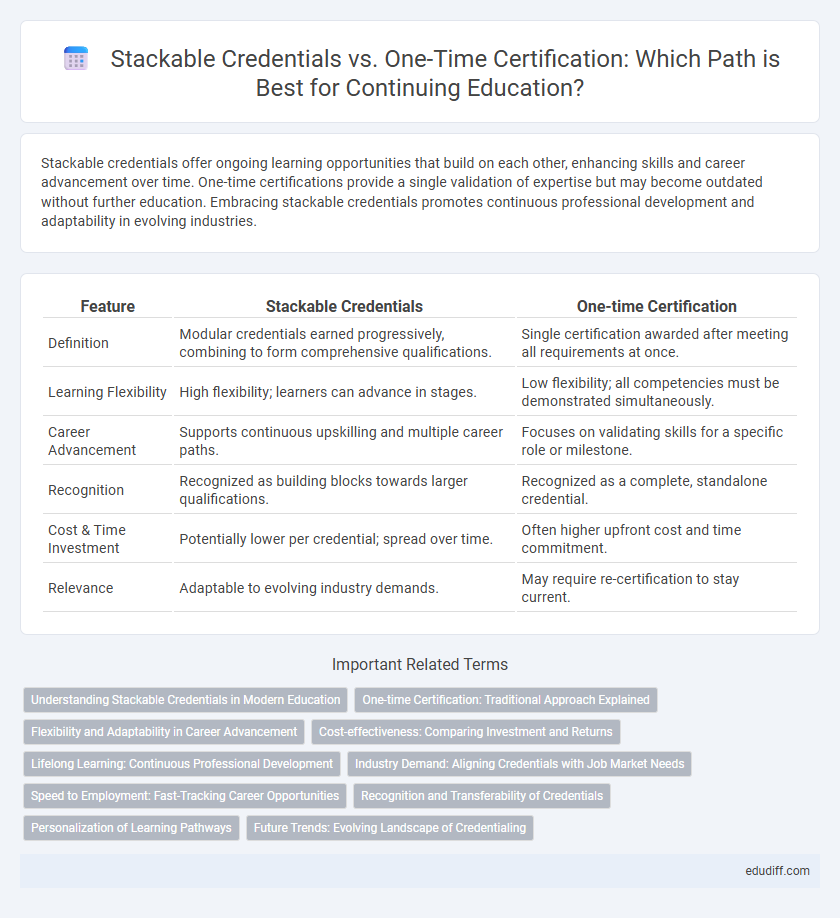Stackable credentials offer ongoing learning opportunities that build on each other, enhancing skills and career advancement over time. One-time certifications provide a single validation of expertise but may become outdated without further education. Embracing stackable credentials promotes continuous professional development and adaptability in evolving industries.
Table of Comparison
| Feature | Stackable Credentials | One-time Certification |
|---|---|---|
| Definition | Modular credentials earned progressively, combining to form comprehensive qualifications. | Single certification awarded after meeting all requirements at once. |
| Learning Flexibility | High flexibility; learners can advance in stages. | Low flexibility; all competencies must be demonstrated simultaneously. |
| Career Advancement | Supports continuous upskilling and multiple career paths. | Focuses on validating skills for a specific role or milestone. |
| Recognition | Recognized as building blocks towards larger qualifications. | Recognized as a complete, standalone credential. |
| Cost & Time Investment | Potentially lower per credential; spread over time. | Often higher upfront cost and time commitment. |
| Relevance | Adaptable to evolving industry demands. | May require re-certification to stay current. |
Understanding Stackable Credentials in Modern Education
Stackable credentials offer a flexible approach to modern education by allowing learners to accumulate smaller, specialized certificates that build toward comprehensive qualifications. These credentials enhance career adaptability and lifelong learning, providing targeted skills that respond to evolving industry demands. Unlike one-time certifications, stackable credentials promote continuous skill development and greater workforce readiness.
One-time Certification: Traditional Approach Explained
One-time certification involves completing a single, comprehensive exam to validate expertise in a specific field, often requiring renewal after a set period. This traditional approach emphasizes a fixed snapshot of knowledge, with limited opportunities for ongoing skill development or specialization. Its simplicity and clear endpoint appeal to professionals seeking immediate credential recognition without incremental updates.
Flexibility and Adaptability in Career Advancement
Stackable credentials offer unparalleled flexibility by allowing professionals to accumulate specialized skills over time, adapting their qualifications to evolving industry demands. Unlike one-time certifications, which provide a fixed set of competencies, stackable credentials enable continuous career advancement through incremental learning and targeted expertise. This adaptability supports dynamic career paths, making it easier to pivot into emerging roles or sectors.
Cost-effectiveness: Comparing Investment and Returns
Stackable credentials offer greater cost-effectiveness by allowing learners to spread tuition fees over time while building skills incrementally, reducing the financial burden compared to one-time certification. This modular approach enhances return on investment through continuous skill enhancement aligned with evolving job market demands. One-time certifications may require substantial upfront costs and risk rapid obsolescence, limiting long-term value for professionals seeking adaptable career growth.
Lifelong Learning: Continuous Professional Development
Stackable credentials provide a flexible and personalized approach to lifelong learning, enabling professionals to acquire new skills incrementally and stay relevant in rapidly evolving industries. Unlike one-time certifications, these modular qualifications support continuous professional development by allowing learners to build on existing knowledge and adapt to changing job requirements. Organizations benefit from employees with stackable credentials through enhanced adaptability and sustained expertise over time.
Industry Demand: Aligning Credentials with Job Market Needs
Stackable credentials offer a flexible approach to meeting evolving industry demand by allowing learners to accumulate specialized skills aligned with specific job market needs, enhancing employability. One-time certifications may quickly become outdated as job requirements shift, whereas stackable credentials provide continuous skill development and adaptability. Employers increasingly prefer candidates with modular, up-to-date qualifications that demonstrate ongoing competency in their field.
Speed to Employment: Fast-Tracking Career Opportunities
Stackable credentials accelerate career entry by allowing learners to acquire targeted skills incrementally, aligning closely with employer demands. One-time certifications often require completing comprehensive programs upfront, potentially delaying job readiness. Fast-tracking employment becomes more feasible as stackable credentials provide timely, practical qualifications that match evolving industry needs.
Recognition and Transferability of Credentials
Stackable credentials offer enhanced recognition by allowing learners to accumulate skills over time and display a comprehensive skillset to employers. These modular credentials improve transferability across industries and educational institutions, facilitating career mobility and lifelong learning pathways. In contrast, one-time certifications often limit recognition to a single qualification with restricted applicability beyond the issuing organization or industry.
Personalization of Learning Pathways
Stackable credentials offer personalized learning pathways by allowing learners to accumulate specific skills and certifications over time, tailored to their career goals and industry demands. One-time certifications provide a fixed set of competencies that may not fully address evolving professional needs or personalized development plans. Emphasizing stackable credentials enhances flexibility and adaptability in workforce training, enabling continuous skill advancement aligned with individual aspirations.
Future Trends: Evolving Landscape of Credentialing
Stackable credentials are reshaping the credentialing landscape by enabling lifelong learning and skill diversification, aligning with the increasing demand for adaptable workforce skills. One-time certifications, while still valuable, are gradually being complemented or replaced by micro-credentials that stack into comprehensive qualifications. This shift supports ongoing professional development and better matches emerging job market needs driven by rapid technological advancements.
Stackable Credentials vs One-time Certification Infographic

 edudiff.com
edudiff.com